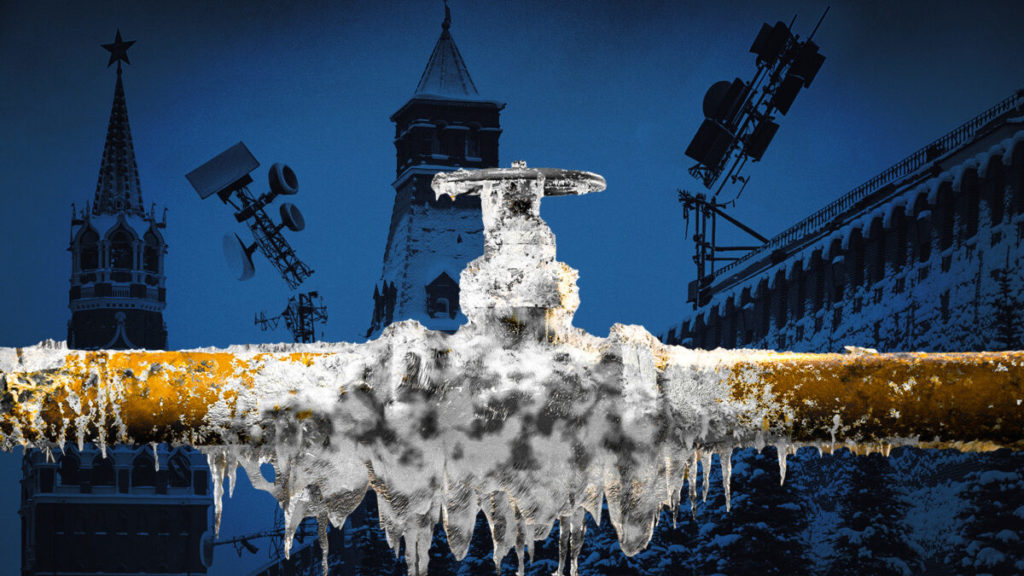Kremlin narratives and hard realities rarely meet. In one of many examples, pro-Kremlin and Russian state-controlled disinformation outlets have ceaselessly declared since the February 2022 full-scale invasion that the ‘special military operation’ is going well, despite the fact that Ukraine has retaken at least half(opens in a new tab) of territory that Russia initially occupied.
But of all these feats of wishful thinking, perhaps the most striking was the Kremlin’s determination to believe that, without imported Russian gas, Europe would freeze to death. Rarely have disinformation narratives arisen with such a dramatic clamour of impending doom, only to disappear relatively quickly into a defeated and ignominious silence.
However, the Kremlin’s core disinformation narratives never die. Instead, they withdraw from sunshine, perhaps to re-emerge with the coming of night. And versions of the ‘freezing Europe’ narrative – including this one(opens in a new tab) alleging that the loss of cheap Russian gas is causing Germany’s ‘de-industrialisation’ – occasionally reappear into the light of public discourse.
So let’s review how Russian propagandists have downplayed the freezing Europe narrative and what alternatives they have found for it.
Energy falsehoods evaporate with the spring
Russia began cutting gas supplies to Europe(opens in a new tab) in the summer of 2022. The cuts’ goals were, mostly likely, to retaliate for European sanctions placed on Russia after the latter’s full-scale military invasion of Ukraine and to pressure Europe to revoke them. The export cuts deepened(opens in a new tab) in August, even before the Nord Stream pipeline explosions in September.
Back then, as we reported last November, Russian officials eagerly predicted(opens in a new tab) that Europe would freeze without Russian gas. A video released via social media, allegedly from Russian energy giant Gazprom, even emerged(opens in a new tab) that purported to show that without Russia gas, Europe would freeze. In fact, pro-Russian outlets and commentators were sure that a lack of Russian gas would raise energy prices so much that the resulting crisis would provoke chaos in European streets and, eventually, the sanctions against Russia would drop.
But then, the winter passed without mayhem, and last spring, commentators dropped talk of freezing Europe. Instead, propagandists began changing the subject to allegedly counterproductive Western sanctions and high energy prices that Europeans are now suffering from. A few articles, however, decided move the goal posts and pushed off the apocalypse to future winters.
For example, this article in Russian alleged(opens in a new tab) that ‘the real energy crisis in Europe is yet to come’. A similar piece declared(opens in a new tab) that the ‘next winter for Europe will be more difficult’. Sometimes outlets focused their fear-mongering on Germany, a typical target. In March of this year, News Front France proclaimed(opens in a new tab), ‘Germany could face gas shortages next winter’. Another known pro-Kremlin outlet Sputnik, however, delayed(opens in a new tab) the German energy reckoning to 2025.
Kremlin’s attempts to change the subject fall like autumn leaves
This autumn, larger Russian state-controlled and other pro-Kremlin outlets and commentators have completely abandoned previous claims that an energy apocalypse looms ominously over Europe. Instead, they have pushed more vague narratives while pretending that they never claimed that Europe would freeze over.
Among these watered-down disinformation narratives, the most dominant asserted that European sanctions on Russian fossil fuels are hurting Europe by raising energy prices(opens in a new tab) and destroying European economies, in particular Germany’s(opens in a new tab). In this telling, sanctions are responsible for all ills. They even caused a bedbug infestation in France. But notice the shift. Instead of apocalyptic winters, Europe faces mere stagflation(opens in a new tab).
As usual, pro-Kremlin outlets never broach the topic of Russian responsibility. It was, after all, Russia’s unprovoked, illegal, and full-scale invasion of Ukraine in February 2022 that triggered Western sanctions, and Russia that began turning off its gas supplies that summer. Instead, propagandists use a cherished tactic – shifting blame – to conjure the cherished myth that Europe is on the verge of collapse.
Other narratives sometimes stand in for the ‘freezing Europe’ theme. Pro-Kremlin outlets talk about how sanctions are strengthening(opens in a new tab) Russia(opens in a new tab), despite their obvious desire to see those sanctions removed. They also like to portray the EU as ‘enslaved(opens in a new tab)’ by the US because Europeans have not submitted to Russian energy blackmail. And they love to showcase divisions within the EU(opens in a new tab) on sanctions that, they assert, will fracture the bloc.
We do not see however, assertions that this winter, or maybe the next one, or the one after that will finally bring about the deep European freeze that Kremlin propagandists so evidently crave. On this topic, the pro-Kremlin infosphere is as barren as Arctic tundra.
How soon they forget the things they said
Pro-Kremlin propagandists lie about everything all the time. At times, they prefer the sort of nebulous falsehoods that contain a kernel of truth wrapped by disinformation. For example, regarding the ‘Russia is winning’ narrative, the Kremlin can point to the taking of Bakhmut, a small victory won at enormous cost(opens in a new tab), while leaving out all the territories that have freed by Ukrainian armed forces.
Arguably, the ‘freezing Europe’ narrative is different. Pro-Russian propagandists made a specific prediction for a specific time: helter-skelter would break out in European cities during the winter of 2022-2023. And the predictions did not come close to coming true. Such a failure in any credible, mainstream Western media organisation would have led to sackings, months of soul-searching, and vows to do better. The response by Russian state outlets was predictable: silence, and awkward attempts to change the subject.

